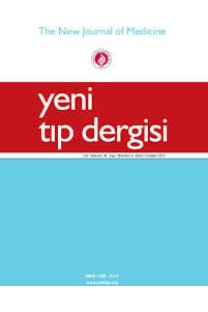An unusual cause of tumor lysis syndrome: Cholangiocarcinoma
Tümör lizis sendromunun nadir bir sebebi: Kolan-jiyokarsinom
___
- 1. Puma V, Sciacca D, Malaguarnera M. Tumor lysis syndrome in elderly. Crit Rev Oncol Hematol 2007;64: 31-42.
- 2. Hande KR, Garrow GC. Acute tumor lysis syndrome in patients with high-grade non-Hodgkin’s lymphoma. Am J Med 1993;94: 133-9.
- 3. Fleming DR, Doukas MA. Acute tumor lysis syndrome in hematologic malignancies. Leuk Lymphoma 1992;8: 315-8.
- 4. Cohen LF, Balow JE, Magrath IT, Poplack DG, Ziegler JL. Acute tumor lysis syndrome. A review of 37 patients with Burkitt’s lymphoma. Am J Med 1980;68: 486-91.
- 5. Zusman J, Brown DM, Nesbit ME. Hyperphosphatemia, hyperphosphaturia and hypocalcemia in acute lymphoblastc leukemia. N Engl J Med 1973;289: 1335-40.
- 6. Dizdar O, Yureli BS, Purnak T, Aksu S, Haznedaroglu IC. Tumor lysis syndrome associated with fludarabine treatment in chronic lymphocytic leukemia. Ann Pharmacother 2004;38: 1319-20.
- 7. Boccia RV, Longo DL, Lieber ML, Jaffe ES, Fisher RI. Multiple recurrences of acute tumor lysis syndrome in an indolent non-Hodgkin’s lymphoma. Cancer 1985;56: 2295-7.
- 8. Mahmoud HH, Leverger G, Patte C, Harvey E, Lascombes F. Advances in the management of malignancy-associated hyperuricaemia. Br J Cancer 1998; 77: 18-20.
- 9. Cairo MS, Bishop M. Tumour lysis syndrome: new therapeutic strategies and classification. Br J Hematol 2004;127: 3-11.
- 10. Crittenden DR, Ackerman GL. Hyperuricemic acute renal failure in disseminated carcinoma. Arch Intern Med 1997;137: 97-9.
- 11. Woo IS, Kim JS, Park MJ, Lee MS, Cheon RW, Chang HM, et al. Spontaneous acute tumor lysis syndrome with advanced gastric cancer. J Korean Med Sci 2001; 16: 115-8.
- 12. Vaisban E, Braester A, Mosenzon O, Kolin M, Horn Y. Spontaeous tumor lysis syndrome in solid tumors: really a rare condition? Am J Med Sci 2003;325: 38-40.
- 13. Alkhuja S, Ulrich H. Acute renal failure from spontaneous acute tumor lysis syndrome: A case report and review. Ren Fail 2002;24: 227-32.
- 14. Kew MC. Hepatic tumors and Cysts. In: Gastrointestinal and Liver Disease. Feldman M, Friedman LS, Sleisenger MH (eds). 2002:1587.
- ISSN: 1300-2317
- Yayın Aralığı: 4
- Başlangıç: 2018
- Yayıncı: -
Mehmet Oğuz YENİDÜNYA, Songül BAVLİ, Ali Özgür KARAKAŞ
Pulmoner hipertansiyon ve yeni sınıflama
ASİYE KANBAY, Hakan BÜYÜKDOĞAN, F.Sema OYMAK, Ramazan DEMİR
An unusual cause of tumor lysis syndrome: Cholangiocarcinoma
Timuçin AYDOĞAN, Cansel TÜRKAY, Burak UZ, İsmail KIRBAŞ, Sibel YENİDÜNYA, Önder SÜRGİT
Yenidoğanda otozomal resesif polikistik böbrek hastalığı
Fuat Emre CANPOLAT, Cenap Erkan KARAKURT, Fatma Türkan MUTLU, Sonay GÖKOĞLU
Branching patterns of facial artery in fetuses
Bıyık Şule BAYRAM, AHMET KALAYCIOĞLU
Kadınlarda transobturator vajinal teyp uygulaması: Kliniğimize ait ilk veriler
Balb/C türü dişi farelerde uniseksüel gruplamanın östrus siklusu üzerine etkileri
Mehmet KANTER, Melike Sapmaz METİN, İMRAN KURT ÖMÜRLÜ
Rinoorbitoserebral mukormikozisli bir olgu
Deniz ERDEM, Esra AKSOY, Demet ALBAYRAK, BELGİN AKAN, Derya GÖKÇINAR, Nermin GÖĞÜŞ
Frontal sinüs tutulumu ile seyreden tüberküloz olgusu
ŞERİFE SAVAŞ BOZBAŞ, Nevra Güllü ARSLAN, MÜŞERREF ŞULE AKÇAY, Nur ALTINÖRS
